Updated 2 months ago
Expert answers to Reddit’s most popular solar panel questions
Written by Ben Zientara Ben ZientaraBen Zientara is a writer, researcher, and solar policy analyst who has written about the residential solar industry, the electric grid, and state util...Learn more , Edited by Catherine Lane Catherine LaneCatherine has been researching and reporting on the solar industry for five years and is the Written Content Manager at SolarReviews. She leads a dyna...Learn more

Why you can trust SolarReviews
SolarReviews is the leading American website for solar panel reviews and solar panel installation companies. Our industry experts have a combined three decades of solar experience and maintain editorial independence for their reviews. No company can pay to alter the reviews or review scores shown on our site. Learn more about SolarReviews and how we make money.
Getting solar panels for your home can bring up many questions, and it can be hard to know if the salesperson you’re working with will give you a straight answer. People often turn to Reddit for answers when they have questions like these.
Reddit can be a great resource, and users generally want to be helpful. However, the advice given on Reddit is sometimes contradictory, and it’s hard to verify who is an expert and who isn’t.
At SolarReviews, we have a lot of expertise in answering these kinds of solar questions. So, we decided to collect some of the most common questions Reddit users are asking about solar panels for their homes so you can find answers you trust all in one place.
Most of these questions can be broken down into 5 major categories:
Are solar panels really worth it?
How do I choose a solar company based on their quote?
What’s wrong with my solar panels? Are they performing as they should?
Are solar batteries worth it? Which brands are best?
Question 1: Are solar panels really worth it?
This is overwhelmingly the top question we see across Reddit when it comes to solar panels. If you search “worth it” in the r/solar subreddit, you’ll find pages of results from just the past few months.
The “right answer” to this question depends on each homeowner’s unique scenario, but there are some overarching principles to follow. Here are some examples:
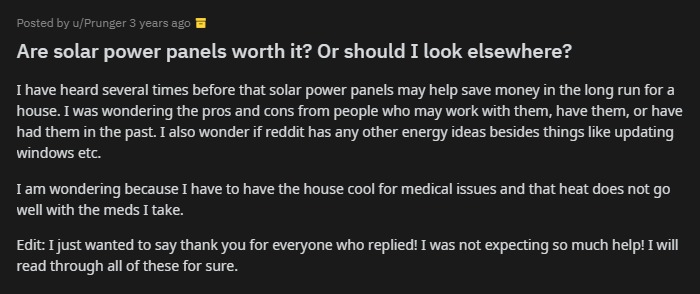
This Reddit user from Kentucky asked for people’s thoughts and experiences with solar panels because they had heard going solar could save you money. What they heard isn’t wrong - solar panels can save you money on your electricity bills. Exactly how much and if it’s worth it is another story.
One response to this thread outlined what other questions the original poster should be asking before deciding if solar is worth it:
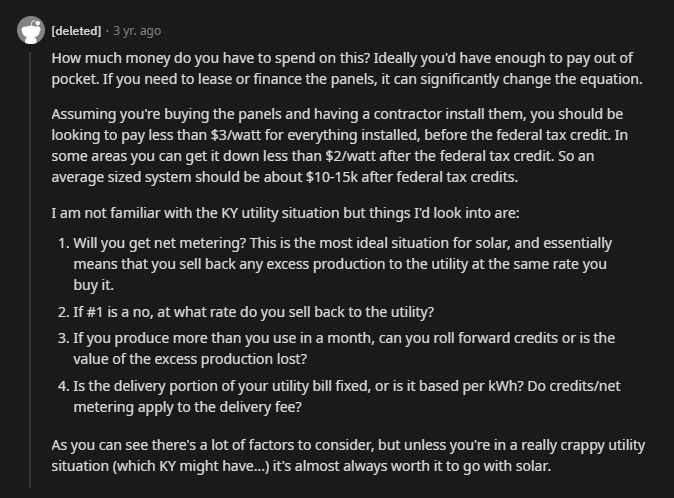
This is all sound advice. But there are a couple of things we would add when you’re considering if solar panels are worth it for you:
Are there additional solar incentives in the state where you live that can reduce the upfront cost or add to the long-term savings?
Is your roof right for solar? (i.e., covered in relatively new materials, facing south, west, or east, and mostly shade-free?)
Other Redditors with this question have already received quotes for solar and have more specific concerns.
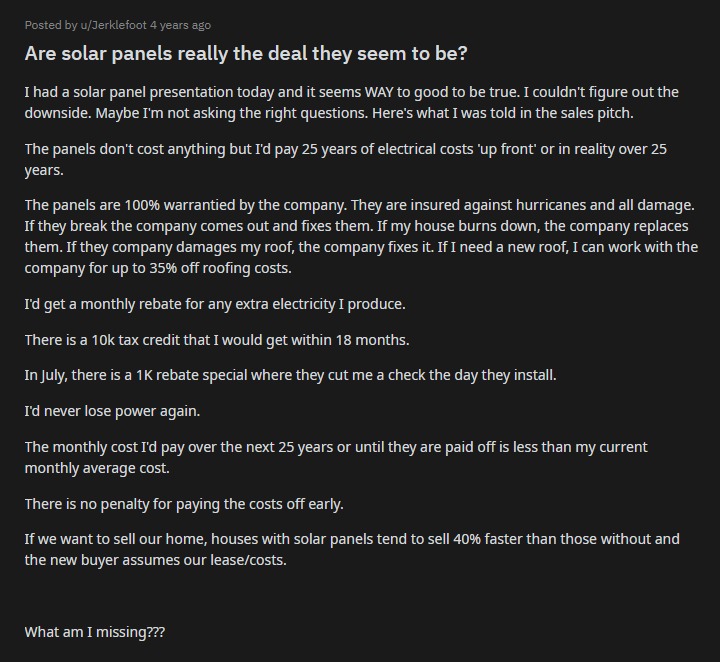
This homeowner had already received a presentation from a solar company with some pretty interesting promises. To someone with experience in the industry, there are some apparent contradictions here.
If we’re being totally honest, it seems like this fast-talking salesperson was telling so many falsehoods that this potential customer has no idea what’s actually being offered.
First things first, it’s extremely unclear how this system would be financed. The poster says, “the panels don’t cost anything,” implying the company is pitching a solar lease or a PPA. Both are “third-party ownership” deals where the solar company owns the panels and sells you the energy you produce. They also say it’s a lease later on in the post.
But, under a lease, the solar company gets all the incentives, including the federal solar tax credit, making us wonder why the poster then says they’ll get “a 10k tax credit” within 18 months. This suggests the company is pitching a solar loan, which would make the homeowner eligible for the tax credit, but they could only get that full amount at once if they have enough tax liability to claim it. Most lending companies require the homeowner to pay the tax credit value towards the loan within 18 months, even if you didn’t have enough tax liability to get the full benefit after the first year.
Furthermore, there is probably no monthly rebate for extra energy. Instead, most states offer some form of net metering, which generally awards credit for excess energy to the customer’s utility billing account. The credit can be applied toward energy charges in future months. Plus, the promise of “a 1K rebate where they cut me a check the day they install” is straight out of the solar panel scam playbook.
Finally, let’s deal with the “never lose power again” claim. Solar panels won’t run your home in a power outage unless paired with a home solar battery. Even then, the battery will likely only power select appliances, not your entire home.
The moral of the story is that if something sounds too good to be true, it probably is. Tricky sales pitches like these are why we always recommend getting multiple quotes for solar panels and comparing them against each other.
Before swallowing a line from a salesperson, you should know how the tax credit works, how solar loans work, and what a solar lease or PPA means for you. Don’t sign anything until you’re 100% sure you understand it. Also, consider running all of this by a trusted financial advisor or tax professional.
Question 2: How do I know if the quote I got for solar is good?
Once you’ve gotten quotes, how do you know which one to pick? Again, many people turn to Reddit for advice.
Here’s an excellent example:
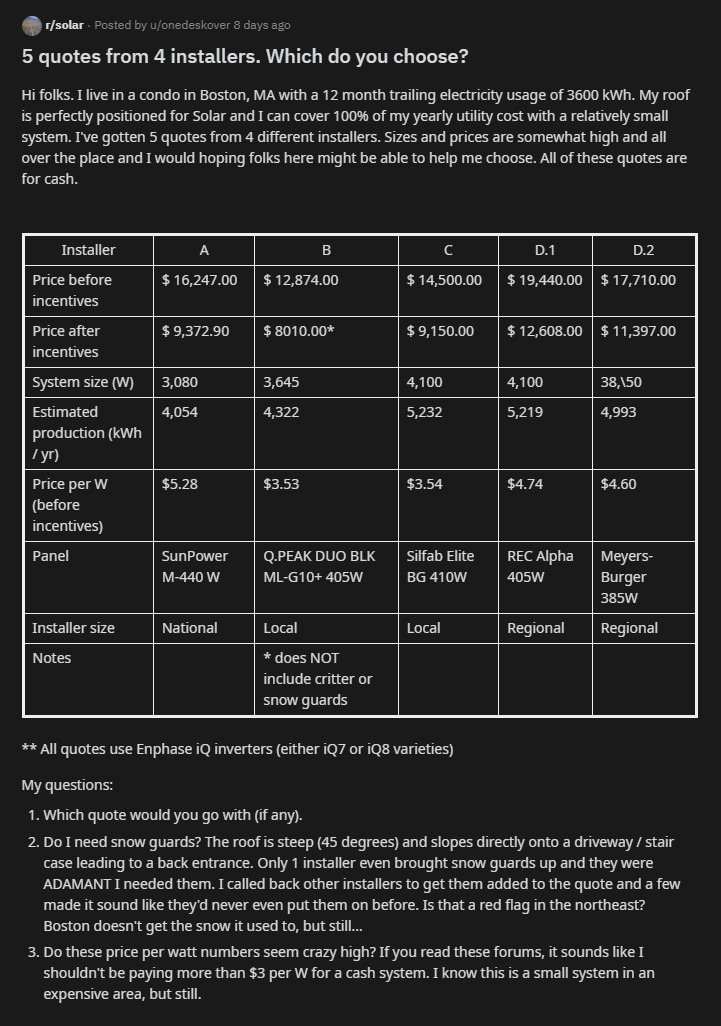
Five quotes from four installers! This person is doing the right thing. And they’re right to use cost per watt before incentives to use to compare apples to apples.
The questions they ask show the benefit of getting multiple quotes—each salesperson will give you unique information you can research on your own. The question about solar snow guards is a good one. If only one company insists you need something, and the others in your area don’t, you probably don’t need to install them unless you want to be extra cautious. It definitely can’t hurt!
They’re also right that the cost per watt seems a bit high in this roundup, but that’s because they need a small solar installation. Installers have fixed costs of engineering, permitting, warehousing, truck rolls, and more that go into every installation, no matter the size. As solar installations get larger, the cost per watt goes down because the additional costs are just the physical materials.
One commenter pointed this out in an interesting way:

In this case, the homeowner could consider increasing their usage by updating appliances to electric before they go solar. That way, they can maximize their system size and maximize their savings, too.
But, the difference in cost per watt can partially be explained by the brands the installers use. The SunPower M-series and REC Alpha panels are more expensive than other brands because they perform better and exhibit lower degradation over time. Panels from Qcells, Silfab, and Meyer Burger are also excellent choices, and using them usually means a lower cost than the super-premium brands, without much loss of energy production.
If the homeowner chose one of these quotes, there’s more to it than just numbers. They should learn more about how to compare solar quotes and find out all the questions you should ask a solar installer when deciding on a quote.
Here are some other important things to consider as you start to look for a solar installer:
Find out the current average cost of solar panels in your area.
Get information about solar incentives offered in your state.
Question 3: What’s wrong with my solar panels? Are they performing as they should?
Right after people install solar panels, they normally want to check their solar panel monitoring app multiple times a day. It’s also normal to wonder if something is broken when the numbers on the app don’t seem to match up with what the installer promised.
For example, this user in Colorado was wondering why their 6.4 kW system seems to have a peak output peaking at 4.8 kW:
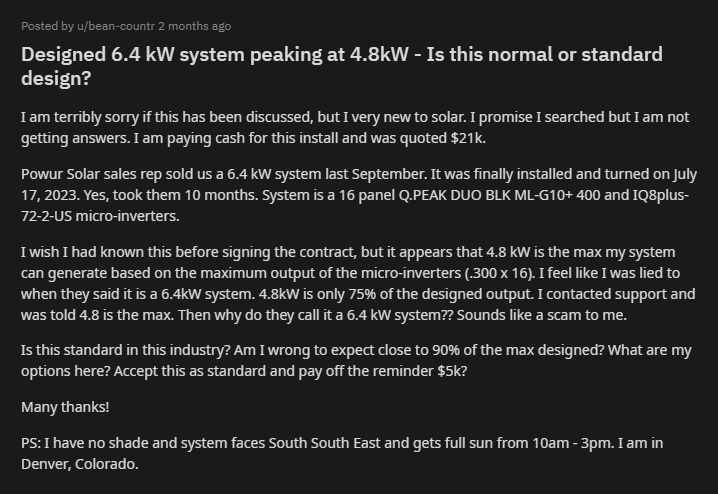
In this case, the sales rep doesn’t seem to have explained how solar panels work well. The 16 Qcells solar panels are rated to output 400 watts at peak, but that output is measured in DC electricity under standard test conditions (STC). Solar panels rarely operate at their full DC power output, but that doesn’t mean anything is broken.
The Enphase microinverters used in the homeowner’s system convert the DC power output of the solar panels into AC and have a maximum output of 300 watts AC, meaning 4.8 kW of AC output is where they max out. But that doesn’t mean there’s a lot of energy being wasted—the time during each day that the panels spend producing more than the possible output of the micro-inverters is very short, and even then only occurs on the sunniest days when the temperature isn’t too high.
More important than maximum instantaneous power output is whether the estimates of total energy output over time will produce the desired savings. In the comments, the homeowner revealed that the installer estimated production of 10,337 kWh per year. At current Xcel Energy rates in Colorado, that’s enough to save the homeowner around $1,405 this year.
The homeowner’s fears could have been put to rest if they knew the difference between DC and AC output, and also how solar panels are rated under STC. You can also use PVWatts to compare your system’s output to highly accurate estimates based on system size and location.
Finally, if something really does go wrong, make sure you understand the warranty coverage you’ll get with your solar installation so you know who to contact to get things fixed.
Question 4: Are solar batteries worth it? Which brands are best?
Batteries are becoming an increasingly popular addition to home solar systems, and there are approximately 1,273 brands of batteries on the market (only a little bit joking). In some states, power outages are a serious problem, so it makes sense that people would be interested in using batteries to protect themselves from blackouts.
That said, the cost of a home solar battery can be pretty high, so Redditors often wonder whether they’re worth it:
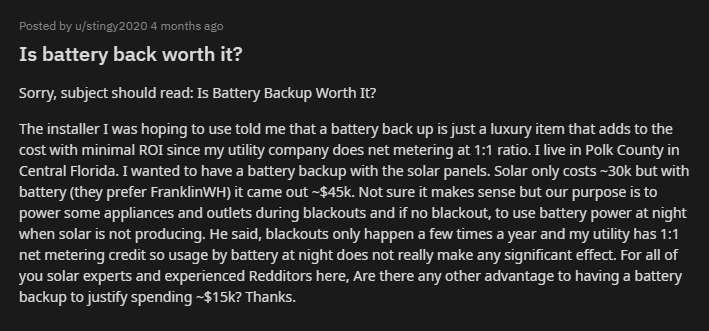
First, let’s acknowledge the installer there, steering a customer away from spending $15,000 unless they were absolutely sure they wanted it. That’s the sign of a good installer (although we do want to point out that the FranklinWH battery can do more than just power a few outlets in a blackout).
There are many situations in which the value of a solar battery is not financial but purely peace of mind. That said, think about how much it might be worth to you to keep your power on in the days after a hurricane. Or, if you’re comparing a home battery to a generator, how much might it be worth to avoid making trips to get fuel when local infrastructure is damaged from a natural disaster?
Thankfully, there are places in the U.S. where batteries are also becoming financially viable, even if you don’t experience frequent power outages. For example, if your state is moving away from net metering, like California with Net Billing (NEM 3.0), a battery can provide you decent savings on your electric bill.
Battery incentives are also becoming more popular in states across the country to help reduce storage costs. Plus, the federal clean energy tax credit can save you 30% of the battery installation cost.
Utilities in some areas offer virtual power plant programs that pay battery owners for allowing the utility to use some of their stored energy when demand on the grid is very high. These programs can earn owners hundreds or even thousands of dollars per year in payments.
If you’re interested in a battery, our coverage of the best solar batteries can provide some solid answers, as can our full reviews of top batteries on the market, like the Tesla Powerwall, LGES Prime batteries, Generac PWRcell, and sonnen batteries.
Question 5: What should you consider before going solar?
The final category of questions in our roundup concerns what to know before you start to get quotes from companies. Solar panels are a major investment with a steep learning curve, so it makes sense that some people are intimidated by the thought of starting the process:
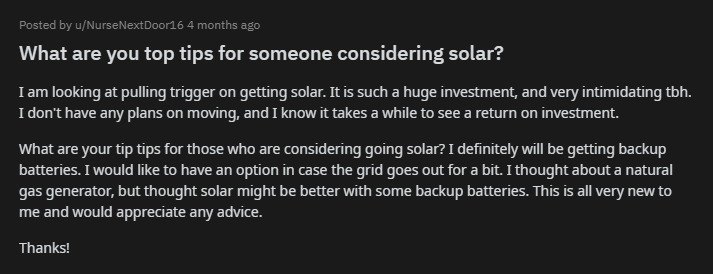
The truth is that not every home is right for solar panels. First, you should learn how solar power works and how a home solar system is built.
Next, check out the things to consider before going solar. Here’s a general list of steps for people who are just getting started on their solar journey:
Know how much energy your home uses in a year and what opportunities you have to make your home more energy-efficient.
Learn about how solar panels work and how a home solar installation is built.
Make sure your roof is right for solar. Does it face the proper direction? Do you need a roof replacement before getting panels installed?
Figure out whether your utility offers net metering or some other solar buyback program and what solar incentives are available in your area.
Get an idea of how many solar panels you need to cover your annual usage so you can better understand the quotes you get.
Compare multiple quotes from solar companies in your area and ask for quotes using different financing options.
Decide whether one of the companies is right for you, and if so, move forward with the installation!
Final thoughts
Searching Reddit reveals all the most important questions people have about solar, both before and after installation. The sections above point you to our expert resources that can help answer those questions without wondering if you can trust the information.
If you’re ready to begin the process of going solar for your own home, start by entering your zip code in the box below!
Ben Zientara is a writer, researcher, and solar policy analyst who has written about the residential solar industry, the electric grid, and state utility policy since 2013. His early work included leading the team that produced the annual State Solar Power Rankings Report for the Solar Power Rocks website from 2015 to 2020. The rankings were utilized and referenced by a diverse mix of policymakers, advocacy groups, and media including The Center...
Learn more about Ben Zientara